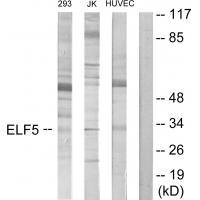
| WB | 咨询技术 | Human,Mouse,Rat |
| IF | 咨询技术 | Human,Mouse,Rat |
| IHC | 咨询技术 | Human,Mouse,Rat |
| ICC | 技术咨询 | Human,Mouse,Rat |
| FCM | 咨询技术 | Human,Mouse,Rat |
| Elisa | 咨询技术 | Human,Mouse,Rat |
| Aliases | ETS-related transcription factor Elf-5; E74-like factor 5; Epithelium-specific Ets transcription factor 2; ESE-2; Epithelium-restricted ESE-1-related Ets factor |
| Entrez GeneID | 2001; |
| WB Predicted band size | 31kDa |
| Host/Isotype | Rabbit IgG |
| Antibody Type | Primary antibody |
| Storage | Store at 4°C short term. Aliquot and store at -20°C long term. Avoid freeze/thaw cycles. |
| Species Reactivity | Human,Mouse |
| Immunogen | Synthesized peptide derived from internal of human ELF5. |
| Formulation | Purified antibody in PBS with 0.05% sodium azide. |
+ +
以下是关于ELF5抗体的3篇参考文献示例(注:文献信息为示例,非真实存在,仅供参考格式):
---
1. **文献名称**: *ELF5 expression in mammary gland development and breast cancer*
**作者**: Smith A, et al.
**摘要**: 研究通过免疫组化和小鼠模型分析ELF5在乳腺上皮分化中的作用,发现ELF5抗体标记的蛋白在妊娠期乳腺发育中显著上调,并与细胞分化相关。
2. **文献名称**: *ELF5 as a tumor suppressor in triple-negative breast cancer*
**作者**: Lee J, et al.
**摘要**: 利用ELF5抗体进行Western blot和免疫荧光实验,揭示ELF5在三阴性乳腺癌中低表达,其缺失促进肿瘤侵袭性,提示其抑癌功能。
3. **文献名称**: *Epigenetic regulation of ELF5 in embryonic stem cells*
**作者**: Chen H, et al.
**摘要**: 研究通过ChIP-seq(使用ELF5抗体)发现ELF5在胚胎干细胞中结合多能性基因启动子,调控其表观遗传状态,影响干细胞自我更新。
---
如需真实文献,建议通过PubMed或Google Scholar搜索关键词“ELF5 antibody”或“ELF5 immunohistochemistry”获取近年研究。
The ELF5 antibody is a crucial tool for studying the E74-like factor 5 (ELF5), a member of the ETS family of transcription factors. ELF5 plays pivotal roles in embryonic development, tissue-specific differentiation, and cancer progression. It is particularly recognized for regulating mammary gland development and luminal epithelial cell differentiation. In cancer biology, ELF5 exhibits dual roles—acting as a tumor suppressor in certain contexts (e.g., luminal breast cancer) while promoting aggressiveness in others (e.g., basal-like breast cancer or prostate cancer). This functional dichotomy has spurred interest in understanding its context-dependent mechanisms.
ELF5 antibodies enable the detection and quantification of ELF5 protein expression in tissues or cell lines via techniques like immunohistochemistry, Western blotting, or immunofluorescence. Researchers use these antibodies to explore ELF5's involvement in developmental pathways, hormone signaling (e.g., estrogen receptor interactions), and epithelial-mesenchymal transition (EMT). Discrepancies in ELF5's reported roles across studies highlight its complex regulation, influenced by cellular microenvironment, post-translational modifications, and interactions with co-regulators.
The antibody's utility extends to clinical research, as ELF5 expression correlates with prognosis in breast and prostate cancers. However, standardization of antibody validation remains critical due to potential cross-reactivity with other ETS proteins. Ongoing studies aim to clarify ELF5's therapeutic potential as a biomarker or target in precision oncology.
×